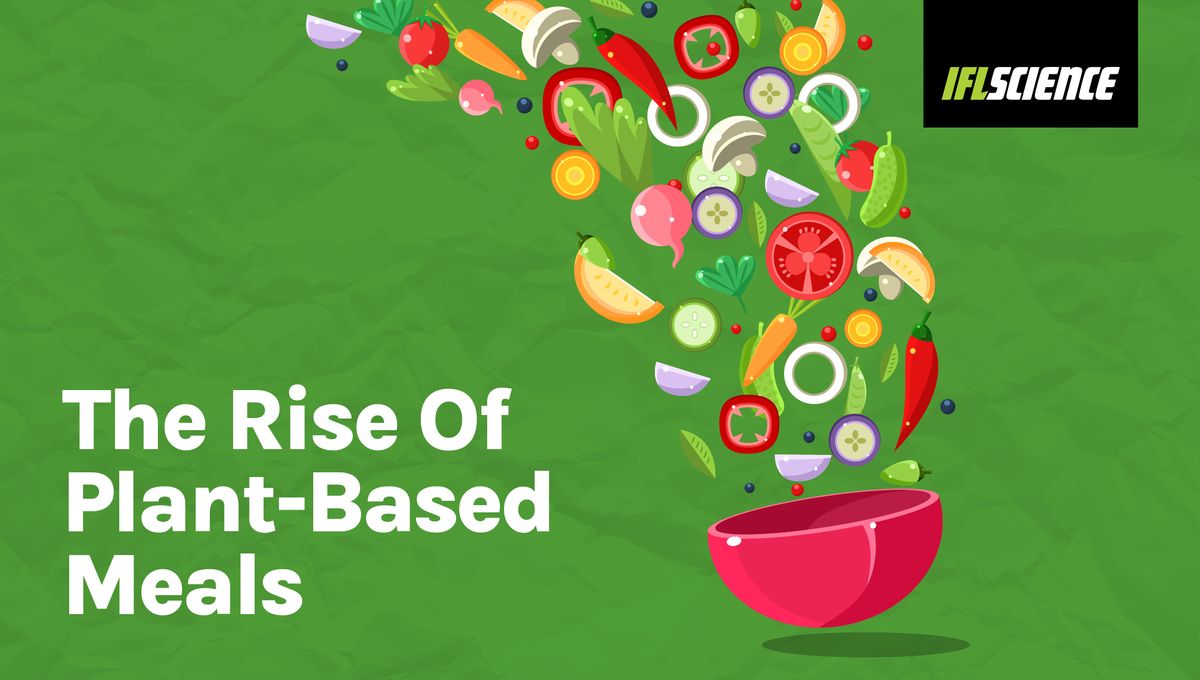
This article forms part of the IFLScience exciting editorial calendar for 2023.
Over the last few years, Veganuary has become more and more popular. A growing number of people are opting to spend the first month of the year chowing down on a plant-based diet – a diet that excludes all animal products, such as poultry, red meat, fish, dairy products, and eggs.
But have you ever thought that a plant-based diet is a new fad? Well, it is actually not a new concept at all, it spans back thousands of years.
Pythagoras of Samos was born in 570 BCE, and he is attributed with the theory of the functional significance of numbers in the objective world and music. However, most people may recognize the name from the Pythagorean theorem (a concept created by his disciples), a principle that involves right angles, triangles, and many confused faces in the classroom.
But he was also one of the first people to mention vegetarianism. In fact, he was so tied with this lifestyle, that until the word vegetarianism was coined, it was actually called the Pythagorean diet.
He claimed that it was the duty of people to be kind to animals, which, as you can imagine, also means not munching down on their flesh.
In Ancient Rome, you may think that those burly gladiators were on a high-protein diet made up of meat. But, in fact, this was not necessarily true. One analysis of their bones found that their diet was mainly grain-based and mostly meat-free.
Fast forward a few thousand years to the early 19th century and the “Pythagorean diet” gets replaced by the term vegetarian. The word was first used in print in 1842 and was later adopted by the Vegetarian Society. The term “vegan” came much later in 1944, through the world’s first vegan advocacy group founded by Donald Watson.
There have been many famous vegetarians from the 19th century to now. These include Mary Shelley – the author of the horror Frankenstein. Although it may be a bit on the nose, some argue the book itself could be seen as an exploration of romantic vegetarianism as the monster refuses to eat meat.
Nikola Tesla was a great inventor but he also experimented with his diet. Early in his life, he was drinking gallons of coffee, along with smoking and eating meat. As he got older, he slowly reduced his meat intake, by becoming a pescatarian (someone who does not eat meat but does eat fish) and eventually a full vegetarian. He claimed that it was to do with his health and well-being, as well as concerns about the environment and agriculture.
Of course, vegetarianism is also deeply rooted in many religions. In India, three prominent religions – Hinduism, Jainism, and Buddhism – have contributed to the country having the lowest rate of meat consumption in the world. The Rastafari religion, which developed in Jamacia, promotes cooking called ital, which is free from most meat, additives, and chemicals.
Meanwhile, Israel hosts the highest percentage of vegans in the world: around 5.2 percent of the population class themselves as vegan, and 13 percent as vegetarian. There are a large number of reasons why Israel is often considered the vegan capital of the world. One is that as the world’s only Jewish-majority county, many people follow the kosher dietary laws so consumption of pork is significantly reduced. Other animal meat can be pricy due to the killing method, also kashrut law means that plant-based meat and cheese can allow the consumer to eat foods (like cheeseburgers) for the first time.
Along with religious beliefs, there are plenty of health benefits to consuming a plant-based diet.
Firstly, this type of diet has been found to reduce blood pressure and reduce the risk of stroke and heart disease. Secondly, the diet is often lower in saturated fat than one that is dominated by meats. A diet high in saturated fat has a greater chance of the person developing heart disease. Thirdly, a plant-based diet high in healthy plant foods was found in one study to reduce type 2 diabetes by 34 percent.
A plant-based diet can also positively impact climate change, as it can reduce an individual’s carbon footprint. According to the UN’s Food and Agricultural Organization (FAO), the livestock sector contributes to 14.5 percent of global human-induced greenhouse emissions. The climate impact of plant-based food is smaller than that of animal products, so switching to more plant-based food could reduce emissions.
Another reason that people may be switching to plant-based meals is the morality of the issue. There is no doubt that a plant-based diet harms and kills fewer animals than a meat-based diet.
The future of plant-based meals is one of promise and opportunity. As Veganuary is becoming more popular, the food industry is taking note and creating more delicious meat mockery products. New products are coming out, from pea protein burgers to lab-grown meat. As this industry grows, more mock meats will be developed with new and innovative ingredients.
There are also more dairy-free options. You may have noticed this if you ever wander into a coffee store asking for an iced brown sugar milk shaken espresso, there is always an array of plant-based milk (we are talking about soy, cashew, almond, or oat, etc) that you can froth up your caffeinated beverage with.
All in all, it seems like plant-based meals will be staying around for a long time.
Source Link: When Did Plant-Based Meals Become So Popular?